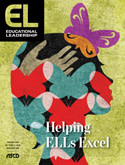A couple of years ago, I talked with a high school history teacher as we waited for an after-school meeting to begin. He began by saying that he and his colleagues were struggling to help a large population of English language learners (ELLs) who recently arrived at the school. Supporting these students was a new challenge for the staff; teachers had received no formal assistance to prepare them for the role.
I asked him if he'd figured out any approaches that seemed useful. He nodded and explained that he had thought about what it would feel like if he were 17 and trying to make his way through high school in a new country. He concluded he'd feel hopeless if he were expected to take home five heavy textbooks each night and read 20 pages in each of them. "It just wouldn't be possible," he said. "I'd be so slow in translating that I couldn't do the work even if I stayed up all night. There just wouldn't be enough hours."
That reality led him to highlight small sections in his students' history textbooks. He chose text, photos, and graphics that captured the essence of a chapter, thinking these selections would feel more manageable to his students. "It made a big difference," he said. "You could see the students' faces light up because someone cared."
If I were an English language learner, I'd want to be in that class—a class where the teacher put himself in my shoes, imagined the challenges I faced, and did something concrete to help me find my way.
Other Good Places to Learn
I'd want to be in the class of the 5th grade teacher who explained that everyone had to take their own next steps in learning and that there would be several times a week when students worked on their own agendas. During personal agenda time, students worked alone, in pairs, in triads or quads, or with the teacher on everything from academic vocabulary to math. Each student had his or her own work to do but also took some time to help his or her peers because that's what members of really good teams do.
In that class, I wouldn't have felt alone or scared—at least not all of the time. There would have been consistent times set aside for me to learn to read and write in a new language, and maybe even better, the opportunity to talk with classmates in small groups, a space that felt safe for trying out a new language. And I wouldn't have felt even more like an outsider by being singled out for special help. I would have taken my own next steps, just like everyone else.
I would have wanted to be in the 7th grade English class where the teacher believed there were always many sides to a story. In this class, students regularly encountered texts that represented multiple cultures and perspectives on issues like prejudice, friendship, family, and stereotyping. There were opportunities to read in pairs, listen to recorded text, and use translation apps. On other occasions, community volunteers translated for ELLs in whole-class discussions. The teacher often gave students questions the night before a discussion so they could prepare answers. She always told the class how much respect she had for students who had to think and speak in two different languages simultaneously.
Every Voice Heard
I'd have wanted to be in the high school history class whose teacher emphasized the importance of each student's voice and perspective being heard in every discussion. This teacher knew the class was poorer if any voice was silent. During class discussions, she prompted students to summarize the previous speaker's statement and then add to it. When students newly arrived from Somalia were clearly reluctant to speak, she'd say, "A word or a phrase that seems important to you will do just fine."
In a very brief time, students took quite seriously the importance of their voices being heard—and more to the point, that they really heard the voices of others. On a year-end course evaluation, a common response from students was, "When the year began, I thought only some of us in this class were smart. Now I realize how much I have to learn from everyone."
I'd want to be in the math class of the 3rd grade teacher who consistently encouraged students to find varied ways to communicate their mathematical thinking—with numbers, words, drawings, charts, colors, and manipulatives. "There are many ways to speak the language of math," she'd remind everyone. "Let's see how many of those ways can work for us today." Students regularly analyzed and responded to what the teacher called "one another's displays of mathematical reasoning." No student was ever voiceless in that room.
That's really it. None of those teachers was any kind of ELL expert. They were humans who understood the immense challenge of starting over in a strange new place. They sought to contribute to their students' successes and to their sense of belonging. They used common sense to figure out how they might do that a little better each day. They embraced newcomers with hope and a spirit of partnership. They learned about ELLs and from ELLs, as they always had with all their students, so they could teach them effectively.
Ideally, I'd want to be in a class where the collective approaches of all these teachers were common practice—regardless of my background.

